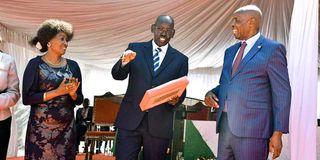KCSE: Unnatural skew, magical deviation

Basic Education Principal Secretary Belio Kipsang (centre) holds up copies of the 2022 Kenya Certificate of Secondary Education (KCSE) exam results released on January 20, 2023, at Mitihani House. With him are Education Cabinet Secretary Ezekiel Machogu (right) and Teachers Service Commission (TSC) CEO Dr Nancy Macharia.
Schools were not ranked in the 2022 Kenya Certificate of Secondary Education (KCSE) examination results released by Education Cabinet Secretary Ezekiel Machogu on Friday. Nevertheless, social and mainstream media were abuzz with the news of new and surprising “academic giants”.
As the celebrations rent the air, however, a pattern was unfolding: An analysis of results from 12 schools in two counties in South Nyanza show that some schools that earlier had a mean score of 5-7 now posted 9-10 despite having admitted in Form One students of different abilities. In addition, several schools had all 388 and 488 candidates, respectively, attaining the minimum university admission grade.
This positive deviation is as magical as the negative skew is unnatural.
When the 8-4-4 system of education was introduced in 1984, it is alleged that the then-district education officer (DEO) of Nyandarua came up with a qualifying exam and a pass mark in Standard One to Eight. If a pupil didn’t attain the pass mark, they were silently retained in the same class. Only the cream reached Standard 8.
If one got to Standard Eight but midway fell short of the pass mark in some mock exam, they were not allowed to register for the Kenya Certificate of Primary Education (KCPE) exam. I know a couple who were held back for so long that they gave up and decided to start a family.
The district topped KCPE for seven consecutive years. The DEO earned praise, even from President Daniel arap Moi, and was quickly promoted by the Ministry of Education. But when his trick was discovered, he was replaced and the anomaly quashed. Nyandarua has not topped since.
Kenya’s examination system is summative, in that it happens at the end of primary or secondary segments of the 8-4-4 education cycle. Since the exams are used for placement, they are high-stakes and have a high-point value.
KCPE determines who joins which secondary school and KCSE the university and for which degree course or tertiary institution and who falls by the wayside. A good KCSE grade is a gateway to all forms of scholarships locally and abroad. Universities and graduate schools are seen as vehicles for moving one closer to the careers that will give them the financial freedom and security they seek.
The Kenya National Examinations Council (Knec), when analysing results, uses parametric tests that assume a normal distribution of values, or a ‘bell-shaped curve’. Simply put, a few students are at the top quartile, a few at the bottom and the majority in the middle. That is why ‘mean grade’ is in the lips of every Kenyan. The results for most of our ordinary schools should follow this statistical rule.
Unscientific
When all the students in a school that admitted learners with varied abilities score a high mean grade in a summative external exam and are in the top quartile, then the result is negatively skewed and there is something unnatural and unscientific about it.
And when tens of schools in a region register a sudden positive deviation of five out of 12 points, (from an average C-minus to B-plus), then that is magical. Some wrong people will be placed in top courses at the university denying the deserving ones the slots. Sadly, Kenyan academic certificates will be on the firing line globally should such practice continue.
When Nelson Mandela was pressured by his supporters, mainly African tribes, to reserve places in education, government and private sector by lowering their pass mark, he said reservations and their products would destroy the nation.
“Destroying any nation does not require the use of atomic bombs or the use of long range missiles,” said President Mandela. “It only requires lowering the quality of education and allowing cheating in the examinations by the students. Patients die at the hands of such doctors. Buildings collapse at the hands of such engineers. Money is lost in the hands of such economists & accountants. Humanity dies at the hands of such religious scholars. Justice is lost at the hands of such judges.....
“The collapse of education is the collapse of a nation.”
Being an intellectual, a PhD holder, President William Ruto knows very well the pain of pursuing an education. He ought to form a commission of inquiry to investigate the conduct of 2022 KCSE exam.
The investigation should focus on the 30 or so schools that behaved extraordinarily. If they are found culpable, he should dismantle Knec in its entirety. That should include the staff, who, it is alleged, shared exam test papers and moderated marking schemes to favour certain schools and regions long before the exam began. He should sack principals, invigilators, supervisors and examiners who collaborated in the cheating. Lastly, move Knec to the Office of the President for close supervision.
Lastly, it is high time we moved away from summative exams. It is not right to determine the future of an individual—and, by extension, a country—using a single sit-in start-stop exam. I am glad that this will be taken care of by the new Competency-Based Curriculum (CBC).
Dr Turuthi, PhD, deputy principal, Flamingo Secondary School, is an educational communication technology expert. [email protected].





